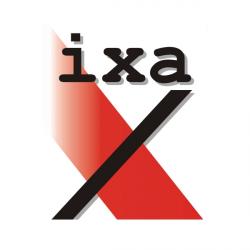Hitz anitzeko terminoen detekzioa eta ulermena ez da arazo erraza. Alemaniako Saarbruken-eko DFKI laborategi ospetsutik bisitan datorkigun Valia Kordoni ikertzaileak horretaz hitz egingo digu: Nola erauzi automatikoki hitz anitzeko terminoak eta nola erabili horiek gramatika eleanitzak sortzeko.
 Gaia: Automated Annotation and Acquisition of Linguistic Knowledge for Efficient Multilingual Grammar Engineering (Hitz anitzeko terminoen erauzketa automatikoa gramatika eleanitzak sortzeko).
Gaia: Automated Annotation and Acquisition of Linguistic Knowledge for Efficient Multilingual Grammar Engineering (Hitz anitzeko terminoen erauzketa automatikoa gramatika eleanitzak sortzeko).
Tokia: 3.2 aretoa. Informatika Fakultatea
Hizlaria: Valia Kordoni (LT-Lab DFKI GmbH & Dept. of Computational Linguistics, Saarland University).
Eguna: Azaroaren 25an
Ordua: 16:00-18:00
Laburpena
In this talk, I mainly deal with automated acquisition of linguistic knowledge as a means of enhancing robustness of lexicalised grammars for real life applications. The case study I focus on in the best part of this talk is Multiword Expressions (henceforward MWEs). Specifically, in the first part of the talk I am taking a closer look at the linguistic properties of MWEs, in particular, their lexical, syntactic, as well as semantic characteristics. The term Multiword Expressions has been used to describe expressions for which the syntactic or semantic properties of the whole expression cannot be derived from its parts (cf., Sag et al., 2002), including a large number of related but distinct phenomena, such as phrasal verbs (e.g., “come along”), nominal compounds (e.g., “frying pan”), institutionalised phrases (e.g., “breadand butter”), and many others. Jackendoff (1997) estimates the number of MWEs in a speaker’s lexicon to be comparable to the number of single words.
However, due to their heterogeneous characteristics, MWEs present a tough challenge for both linguistic and computational work (cf., Sag et al., 2002).For instance, some MWEs are fixed, and do not present internal variation, such as “ad hoc”, while others allow different degrees of internal variability and modification, such as “spill beans” (“spill several/musical/mountains of beans”). With the observations about the linguistic properties of MWEs at hand, I turn in the second part of the talk to methods for the automated acquisition of these properties for robust grammar engineering. To this effect, I first investigate the hypothesis that MWEs can be detected by the distinct statistical properties of their component words, regardless of their type, comparing various statistical measures, a procedure which leads to extremely interesting conclusions. I then investigate the influence of the size and quality of different corpora, using the BNC and the Web search engines Google and Yahoo. I conclude that, in terms of language usage, web generated corpora are fairly similar to more carefully built corpora, like the BNC, indicating that the lack of control and balance of these corpora are probably compensated by their size. Then, I show a qualitative evaluation of the results of automatically adding extracted MWEs to existing linguistic resources. To this effect, I first discuss two main approaches commonly employed in NLP for treating MWEs: the words-with-spaces approach which models an MWE as a single lexical entry and it can adequately capture fixed MWEs like “by and large”, and compositional approaches which treat MWEs by general and compositional methods of linguistic analysis, being able to capture more syntactically flexible MWEs, like “rock boat”, which cannot be satisfactorily captured by a wordswith-spaces approach, since this would require lexical entries to be added for all the possible variations of an MWE (e.g., “rock/rocks/rocking this/that/his…boat”). On this basis, I argue that the process of the automatic addition of extracted MWEs to existing linguistic resources improves qualitatively, if a more compositional approach to grammar/lexicon automatedextension is adopted.
Finally, I also propose that the methods developed for the acquisition of linguistic knowledge in the case of the English MWEs can be tuned to enhance robustness of lexicalised grammars for languages with richer morphology and freer word order, as is the case of German, and can benefit from gold standard syntactically and semantically annotated corpora, for the (semi-automated) development of which I am briefly showing a very simple statistical ranking model which significantly improves treebanking efficiency by prompting human annotators to the most relevant linguistic annotation decisions.




